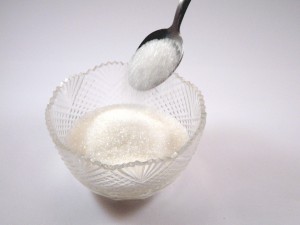 For years, doctors have debated sugar’s role in causing diabetes. The prevailing medical opinion has been that eating more sugar means eating more calories, and it’s the resulting weight gain that leads to diabetes. But a major new study shows a direct link between sugar and diabetes — a link that’s independent of a person’s weight.
For years, doctors have debated sugar’s role in causing diabetes. The prevailing medical opinion has been that eating more sugar means eating more calories, and it’s the resulting weight gain that leads to diabetes. But a major new study shows a direct link between sugar and diabetes — a link that’s independent of a person’s weight.
KQED’s Stephanie Martin interviewed one of the study’s authors, Dr. Robert Lustig from UCSF. Lustig is an expert on childhood obesity and has been vocal about the health hazards of sugar for years. His video “Sugar: The Bitter Truth” has more than three million views on YouTube.
Lustig told Martin that the study was very carefully done — researchers looked at sugar consumption in 175 countries over a decade and controlled for just about everything including obesity, poverty, and physical activity. They found that the more sugar in the food supply, the higher the rates of diabetes in that country, no matter what the obesity rates were.
In the study, sugar was 11 times stronger than total calories in explaining diabetes rates around the world. “Those countries where sugar went up showed increases in [diabetes] rates. Those countries where sugar availability went down, showed decreases in rate.”
Lustig said their findings point to proof of causation that should be accepted by doctors. “This is the same level of proof that was available to us when we implicated cigarettes as the cause of lung cancer back in the 1960’s,” he told Martin. He believes the findings are sufficiently strong to lead to policy interventions around sugar.
Lustig has long suspected sugar as a major driver of diabetes. He pointed out that diabetes afflicts people across the weight spectrum.
“Twenty percent of obese people have completely normal metabolic signatures,” Lustig told Martin. “Conversely, up to 40 percent of normal weight people have the exact same metabolic problems that the obese do; they are just not obese. The obesity is a marker for the metabolic problems which we call metabolic syndrome, rather than a cause.” He cautioned that people who are normal weight, but eat a lot of sugar, could be sick and not know it.
The study was not designed to address whether the type of sugar mattered — for example, table sugar versus high fructose corn syrup. Lustig said that in the study researchers looked at all sugars collectively, not individually.
At present, sugar is classified by the Food and Drug Administration as “Generally Regarded As Safe.” Lustig believes the FDA should re-evaluate whether sugar should stay on that list. He has previously called for sugar to be regulated in the same way alcohol is.
Marion Nestle, professor of nutrition, food studies and public health at New York University was not affiliated with the study, but in a release she praised the research saying it was the first paper she knew of to link sugar consumption to diabetes. She said the study adds to a body of research that is sufficient to “advise people to keep their sugar a lot lower than it normally is.”
In his medical practice, Lustig says he sees adolescents with Type 2 diabetes. He asserts that one-fourth of U.S. adolescents consume at least 840 calories a day in sugar, more than 40 percent of a daily diet of 2,000 calories. “The question is,” he asked rhetorically, “what does that do to you? What does that do to your liver? What does that do to your pancreas?”
Learn More: